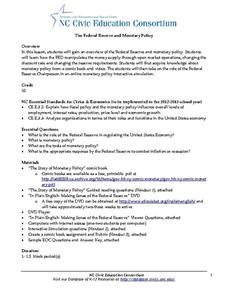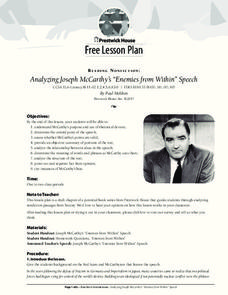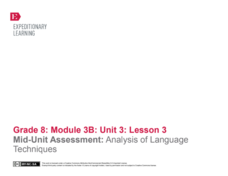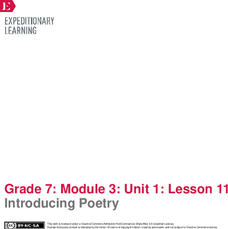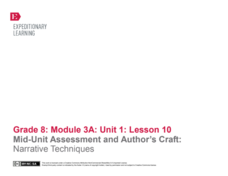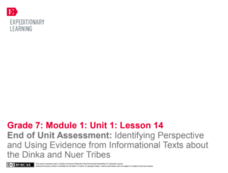Curated OER
First Day of School
Primary learners complete pre reading, writing, during reading, and interdisciplinary activities for the book First Day of School. They will complete journal entries, answer short answer questions, have discussions, and much more.
Core Task Project
Whatif by Shel Silverstein
What a skillful way to incorporate Shel Silverstein, a wonderful author, into the classroom. Composed of three tasks, children are led through a series of text-dependent questions that force them to unveil the meaning of Silverstein's...
Carolina K-12
The Federal Reserve and Monetary Policy
How does the Fed manipulate the money supply in the United States? After reading a comic book on monetary policy and answering guided questions, your class members will participate in an interactive online simulation in which they will...
Museum of the American Revolution
Dissecting the Declaration
Delve into the past to understand the issues that led to the Declaration of Independence. Academics read excerpts from the Declaration of Independence and take a virtual tour of the American Revolution Museum. The resource explains how...
Jessica Winston
Gingerbread Friends Lesson Plan Guide
Full of activities for Jan Brett's story "Gingerbread Friends," this resource will get your kids in the mood for some snacks, fortify their need for vocabulary, and fill their minds with story elements.
Foreign Policy Research Institute
Ancient and Medieval China
This is a thorough lesson plan on Chinese history that includes readings from primary and secondary sources, guided reading questions, videos, and a take-home final assessment. While it indicates an audience from 9th through 12th grade,...
EngageNY
Read Expressions in Which Letters Stand for Numbers
Pencil in the resource on writing verbal phrases into your lesson plans. The 15th installment of a 36-part module has scholars write verbal phases for algebraic expressions. They complete a set of problems to solidify this skill.
EngageNY
Poetry Analysis: Small Group Practice
Howdy partner! After discussion and teacher model reading of Slaveships, scholars pair up for a partner reading of the poem. They then use equity sticks to discuss their thoughts of the poem with the class. Readers talk about allusion,...
Learning for Justice
The Color of Law: Developing the White Middle Class
The final lesson in the "Color of Law" series explores the government's discriminatory economic policies. Young scholars watch videos, read primary source materials, and examine images to gather information. They discuss how what they...
Prestwick House
Reading Nonfiction: Analyzing Joseph McCarthy's "Enemies from Within" Speech
Looking for a instructional activity that teaches class members how to analyze nonfiction? Use Joseph McCarthy's famous "Enemies from Within" speech as a instructional text. Worksheet questions direct readers' attention to the many...
EngageNY
Analyzing Text Structure: “The Shakespeare Shakedown”
Pupils continue reading and discussing Simon Schama's article "The Shakespeare Shakedown." They work together to analyze the article's paragraph structure, completing a note-catcher worksheet.
EngageNY
Mid-Unit Assessment: Analysis of Language Techniques
Show what you know. Learners demonstrate mastery of English grammar and usage by completing a pen-and-paper assessment of verbals and verb shifts. In addition, they begin composing a book review based on an independent reading book. The...
EngageNY
Introducing Poetry
A silent reading session permits class members to meet individually with their teacher to discuss their text. Learners then discuss and express their observations about two poetry quotes, recording thoughts about craftsmanship, forms of...
Classroom Law Project
Should we believe everything we read? Becoming a discerning consumer of media
Class members investigate the role media should play in a healthy democracy. As part of this study, groups analyze political advertising, use FactCheck to assess not only the veracity of but the persuasions techniques used in candidates'...
Curated OER
Exploring George Washington's Leadership
Learners examine primary documents to determine whether or not George Washington was an honest leader. In this presidential history instructional activity, students evaluate Washington's leadership prior to and during his presidency....
Center for Civic Education
What Basic Ideas About Government Are Included in the Preamble to the Constitution?
Young historians explore the meaning of the Preamble to the US Constitution in this upper-elementary social studies activity. Working with partners or in small groups, children discuss the purpose of government before reading and...
Curated OER
Ethos, Logos, and Pathos in Civil Rights Movement Speeches
Examine three speeches while teaching Aristotle's appeals. Over the course of three days, class members fill out a graphic organizer about ethos, pathos, and logos, complete an anticipatory guide, read speeches by Martin Luther King Jr.,...
EngageNY
Grade 9 ELA Module 3, Unit 1, Lesson 3
To what extent can the surrounding environment influence one's behavior? Temple Grandin explores her connection to animals and her unique ability to understand their behavior with a lesson plan focusing on her book, Animals in...
EngageNY
Grade 10 ELA Module 4, Unit 2, Lesson 20
Using the resource, scholars work in small groups to rehearse a selected scene from Shakespeare's Macbeth. Finally, they present their interpretive dramatic readings to a group of peers or the whole class and complete a self-assessment...
EngageNY
Mid-Unit Assessment and Author’s Craft: Narrative Techniques
Scholars work together to compile a list of things good writers do to perfect their craft and write the ideas on a whiteboard. They then discuss the differences between passive and active sentences and use their knowledge to identify...
EngageNY
End of Unit Assessment: Identifying Perspective and Using Evidence from Informational Texts about the Dinka and Nuer Tribes
Pupils consider the varying perspectives of people in different cultural groups as they read an informational text about the Dinka tribe of Southern Sudan and complete graphic organizers. They also respond to a constructed-response...
EngageNY
Finding Relevant Information and Asking Research Questions: The Benefits of Video Games
Video games may not be so bad after all. As scholars read the text "The Many Benefits, for Kids, of Playing Video Games," they summarize the gist in their researchers' notebooks. Next, pupils draft supporting research questions based on...
Historical Thinking Matters
Spanish-American War: 5 Day Lesson
Nine historical documents, an interactive online notebook, and a fantastic opportunity for historical inquiry await your pupils in this 5-day lesson plan. Class members identify and discuss various causes for the Spanish-American War...
National Endowment for the Humanities
Poems that Tell a Story: Narrative and Persona in the Poetry of Robert Frost
Dig in deeper with Robert Frost's, "Stopping by Woods on a Snowy Evening." Learners will read and discuss poems by Robert Frost and learn the meaning of terms such as narrative and personal. They journal, collaborate, and present poetry...




